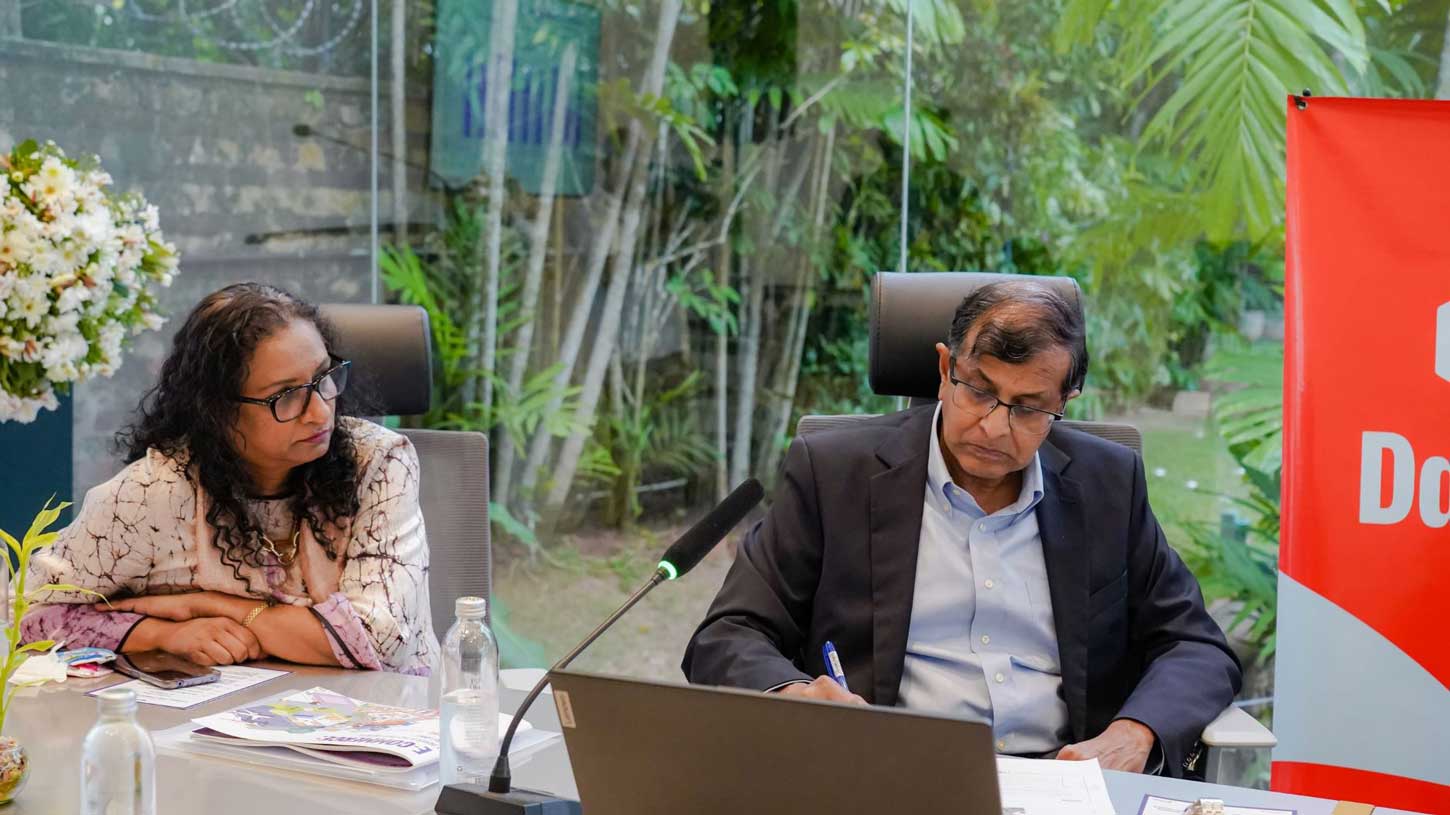DARAZ
E-commerce: An Islandwide Phenomenon and a Youth-oriented Futuristic Industry of
Sri Lanka – Report

Daraz Sri Lanka and Sri Lanka Association for Software Services Companies (SLASSCOM) released the first in-depth study on the adoption and use of e-commerce in Sri Lanka during difficult economic times at a roundtable discussion held in Colombo on Monday 30th January 2023. The report titled “E-commerce: A Driver of Inclusive Growth in Sri Lanka?” was presented to and discussed with the State Minister of Technology, Hon. Kanaka Herath, in the presence of key report contributors.
This report is the result of a partnership between Daraz Sri Lanka and the Sri Lanka Association for Software Services Companies (SLASSCOM) and aims to bridge crucial data gaps in the e-commerce industry, while also pointing to essential policy needs.
Dr Ganeshan Wignaraja, a Professorial Fellow in Economics and Trade at Gateway House, Mumbai and a Senior Research Associate at ODI Global, London, designed and co-authored the report together with Ms Anishka De Zylva, Head of Public Policy and Corporate Affairs at Daraz Sri Lanka. The survey was conducted by NielsenIQ Sri Lanka, under the supervision of Ms. Therica Miyanadeniya, Country Director of NielsonIQ Sri Lanka.
Commenting on the report, Dr Ganeshan Wignaraja opined, “An expanding digital economy and the e-commerce sector are supportive of the economy’s shift from crisis to recovery in Sri Lanka’s 75th anniversary of independence. The first report on the sector aims to facilitate discussion of a market-friendly business environment by identifying micro-level dynamics of the e-commerce industry in Sri Lanka.”

The report is based on the meticulous collection of primary data through an islandwide survey of a sample population of more than 4,500 participants undertaken between March 2022 and July 2022. The survey collected information in areas that are relevant to making business strategies and public policies covering the:
(i) the use of e-commerce across provinces and districts;
(ii) the types of goods and services purchased;
(iii) purchasing behaviour during the pandemic;
(iv) user behaviour by characteristics;
(v) the types of devices and payment methods used for e-commerce purchases;
(vi) factors discouraging online purchasing;
(vii) the use of e-commerce for selling goods and services; and
(vii) the influence of government policy on e-commerce transactions from both a seller and consumer perspective.
Mr. Rakhil Fernando, Managing Director of Daraz Sri Lanka further added “E-commerce is still a relatively new industry in Sri Lanka. However, one of the main findings of this research is that e-commerce is already an islandwide phenomenon, and it is widely used for purchasing goods and services. Over 50% of the survey respondents in all provinces said they use e-commerce to purchase goods and services, and provinces close to and further away from the Western Province are not lagging in terms of e-commerce adoption. This is a strong indicator that e-commerce will play a catalytic role in advancing retail trade in Sri Lanka, despite the challenging landscape. The survey also provides many insights and ideas for the future growth of the industry, along with suggestions for a better business enabling environment which can lead to unlocking multiple opportunities if implemented within an apt policy framework.”
Mr Ashique M. Ali, Chairperson of SLASSCOM, also explained that, “The accelerated growth of e-commerce has transformed the way businesses operate in the post-pandemic world. We have observed that in our region and beyond, countries that were quick to adopt e-commerce and digital payment methods have witnessed much higher, inclusive economic growth and this positive impact and trend can be beneficial for Sri Lanka, albeit the challenges of the economic crisis. This e-commerce research report provides a baseline for steering the expansion of the e-commerce sector amidst common challenges such as a lack of knowledge on e-commerce and low levels of trust in digital payment methods. We hope the guidance and ideas offered by this report will be appropriately employed by the relevant stakeholders including the government and businesses, to create a more enabling business environment in which all businesses, including MSMES, women-led businesses, and even home-based artisans can thrive and grow in.”
The report will be made available as a downloadable pdf file on the Daraz and SLASSCOM corporate websites to anyone interested in understanding the industry at a deeper level. For more information email corporateaffairs@daraz.lk.
About the Daraz Group
Founded in 2015, Daraz is South Asia’s leading e-commerce platform in Pakistan, Bangladesh, Sri Lanka, Nepal, and Myanmar. It empowers more than 200,000 active sellers with world-class marketplace technology to reach the fast-growing consumer class in a region of 500 million people. Through Daraz Express and Daraz Pay, it operates the most efficient and digitalised logistics and payments infrastructure in its markets. Daraz’s vision is to be a champion of South Asia serving 50 million consumers and businesses by 2030.
For more information, please visit www.daraz.com
About SLASSCOM
Sri Lanka Association for Software Services Companies (SLASSCOM) is the national chamber for the knowledge and innovation industry in Sri Lanka and acts as a catalyst of growth. SLASSCOM facilitates trade and business, education and employment, and research and innovation, by influencing relevant national policy frameworks. Over 400 companies in Sri Lanka with a 113,000+ employee base are members of SLASSCOM. SLASSCOM drives industries of the future, especially those with the potential of becoming an export revenue earner for Sri Lanka
Executive Summary of the Report:
Sri Lanka’s economy is at crossroads with heightened interest in sectors that can provide new economic dynamism and jobs in these difficult economic times. The economy was at its lowest point in 2022, and the country is still in the throes of the worst economic crisis in 75 years of independence, weighted by the combined effects of the COVID-19 pandemic, the Russia-Ukraine conflict, conservative business practices, and inward-oriented national economic policies. Meanwhile, a diverse set of Asian countries have witnessed the accelerating use of digital technologies and e-commerce in recent years, which has propelled economic transformation and prosperity.
A critical question facing businesses and the government is how can the power of digital technologies and e-commerce be similarly harnessed for Sri Lanka’s economic revival over the next few years. However, data gaps mean that little is known about the micro-level behaviour of the e-commerce sector and the appropriate public policy framework needed to support the expansion of this nascent sector.
This report is the first in-depth study on the e-commerce sector in Sri Lanka during difficult economic times. It is based on the painstaking collection of primary data through a large-scale islandwide survey of a sample population of 4,670 undertaken between March and July 2022.
The survey collected information in areas that are relevant to making business strategies and public policies:
(i) the use of e-commerce across provinces and districts;
(ii) the types of goods and services purchased;
(iii) purchasing behaviour during the pandemic;
(iv) user behaviour by characteristics;
(v) the types of devices and payment methods used to make e-commerces purchases; (vi) factors discouraging online purchasing;
(vii) the use of e-commerce for selling goods and services; and
(viii) the influence of government policy on e-commerce transactions from both a seller and consumer perspective.
The main findings from the e-commerce survey for Sri Lanka are the following:
- E-commerce is an islandwide phenomenon for purchasing goods and services. Encouragingly, over 50% of the survey respondents in all provinces say they use e-commerce to purchase goods and services. Additionally, provinces close to and further away from the Western Province are not lagging behind in terms of e-commerce adoption.
- Reflecting the early stage of e-commerce industry development, online shopping is dominated by consumer goods, and a number of services such as telecommunication (phone and data bills), taxi services, and food delivery, and new goods categories like groceries are trending. There is growing awareness of the wide range of goods and services available for online purchasing, along with interest in diversifying into new e-purchases.
- The COVID-19 pandemic and lockdowns ushered in a new era for e-commerce for those sampled. There was an increase in purchasing goods and services online due to necessity. This shift seems to remain and grow in normal times even as physical shops have opened.
- E-commerce use is positively linked to education and household income. Middle-income households educated to at least secondary school levels (with knowledge and some financial means) tend to purchase more online than lower-income households with limited education.
- Interestingly, there is little gender bias in e-commerce purchasing with both men and women shopping online. This result suggests that traditional social behaviours are altering, with more men and women sharing household income and electronic devices.
- The most used device for online shopping is the smartphone, with 95% of e-commerce users using their smartphones to make online purchases.
- Payment for online purchases is largely cash-on-delivery due to mistrust and a lack of education around e-commerce and digital payment methods. This outcome fits with the country’s early development stage of the e-commerce sector.
- Survey respondents say that they are discouraged from shopping online because of a lack of requisite knowledge and skills to do so, worries about the quality of online purchases and poor customer experiences after placing orders.
- Online selling of goods and services has increased since the COVID-19 pandemic, and this increase is linked to low start-up costs and the need to diversify livelihoods.
- Over 89% of e-commerce users indicate that a coherent and predictable policy framework can support the growth of the country’s e-commerce industry. Important actions include raising awareness of the benefits of e-commerce, training on how to buy and sell goods and services online, better cyber and online security and reforms for trade and tax regimes that take the e-commerce industry and its export potential into account.
The findings of this e-commerce survey underline that e-commerce has emerged as a vibrant economic sector in Sri Lanka. While it still largely operates under the radar, the above findings suggest that it can stimulate retail trade on an islandwide basis and help transform the country. It is up to businesses and the government to work together to translate that development potential into concrete reality to improve the lives of all Sri Lankans in these difficult economic times.
Media Contact
Name/Designation: Champika Thalgodapitiya/ PR Director
Mobile No.: 0773 856 757
Email Address: champika@omnicommediagroup.lk




